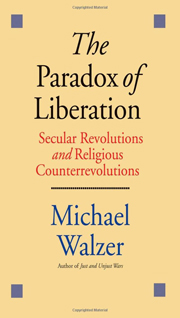 Michael Walzer, The Paradox of Liberation; Secular Revolutions and Religious Counterrevolutions (New Haven: Yale University Press, 2015), 172pp.
Michael Walzer, The Paradox of Liberation; Secular Revolutions and Religious Counterrevolutions (New Haven: Yale University Press, 2015), 172pp.
How do we explain the "recurring and disturbing" paradox, asks Michael Walzer, that secular revolutions of national liberation, based upon western ideals like democracy and modernization, are often followed in short order by fundamentalist religious counterrevolutions that in many ways are their exact opposite? Why do the early successes of liberation from foreign rule give way to religious revivalism that subverts the original goals? Walzer, a leading political theorist of our time, has written about this phenomenon for twenty years, and some of the material in this book has appeared in previous publications. But after delivering the Henry L. Stimson Lectures at Yale in 2013, he revised and expanded the material into this present book.
To explore this question, Walzer considers three case studies — Israel, India, and Algeria. Here we have three different countries with three different religions, but in each case, with some important differences, about 20 to 30 years after independence or liberation, the newly secular state was challenged by resurgent religious fundamentalism — Hindu militants, ultra-Orthodox Jews and messianic Zionists, and Islamic radicals. "The backwardness came back," he writes. The secular liberation hasn't been defeated, but it has faced unexpected and complex challenges.
Walzer doesn't argue that this pattern is universal. Obviously, three case studies is a small data set. One could think of exceptions that don't fit his theory, as he does in a brief post-script on the United States. Critics have cautioned him not to overstate the similarities and ignore the differences in his three examples. Nonetheless, he asks, "why have the leaders and militants of secular liberation not been able to consolidate their achievement and reproduce themselves in successive generations?" The goal isn't to negate, ban, or abolish traditional religious worldviews, but to engage them. Others have worked to retrieve liberationist tendencies within their own religious traditions. Marx might have been right about many things, but so far he has been badly wrong to predict that religion would "wither away." Political liberationists ignore this reality at their peril.


